国花系列:TULIP(荷兰)
日期:2008-03-15 12:03
(单词翻译:单击)
In 1593 tulips were brought from Turkey and introduced to the Dutch. The novelty of the new flower made it widely sought after and therefore fairly pricey. After a time, the tulips contracted a non-fatal virus known as mosaic, which didn't kill the tulip population but altered them causing "flames" of color to appear upon the petals. The color patterns came in a wide variety, increasing the rarity of an already unique flower. Thus, tulips, which were already selling at a premium, began to rise in price according to how their virus alterations were valued, or desired. Everyone began to deal in bulbs, essentially speculating on the tulip market, which was believed to have no limits.
是土耳其人最先把他们著名的郁金香介绍给荷兰人,继而引发了英国和荷兰的郁金香热。16世纪从伊斯坦布尔运往维也纳的郁金香球茎极受欢迎,到了1634年,荷兰人把这称作“郁金香狂潮”。当时人们把钱投资到郁金香就好比现代人投资股票。在17世纪的土耳其,这是段充满高雅气息充满意趣的历史,被称作“郁金香时代”。
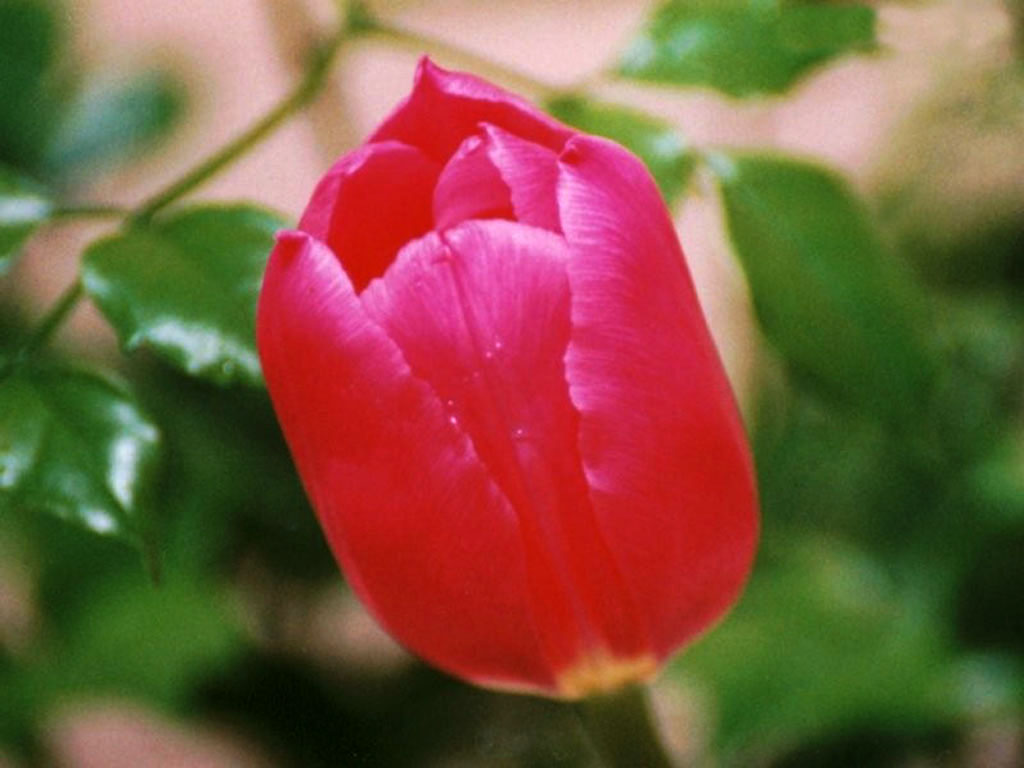
A spring trip to Amsterdam and the Netherlands is not complete without a visit to the Dutch countryside to see the tulip fields in bloom. Touring Keukenhof Gardens, the worlds' largest tulip gardens, is a wonderful shore excursion, but we were amazed at the amazing cultivated gardens throughout the country. During a trip to the Netherlands in mid-April, we saw tulip fields in Noord Holland, Zuid Holland, and Friesland. In addition, there were some beautiful tulip fields next to Keukenhof Gardens, near the large windmill.
在荷兰,郁金香是美好、庄严、华贵和成功的象征。虽说荷兰的郁金香誉满全球,其实郁金香的故土在土耳其。土耳其人更钟爱郁金香。郁金香的生物学名是Tulipa,来自土耳其语TUber1d,含义是郁金香花象包着头巾的伊斯兰教少女一样美丽。郁金香成为土耳其的国花比荷兰还早。郁金香为热爱它的人们带来了多姿多彩的幸福生活。匈牙利、伊朗、新西兰也把郁金香定为本国国花.
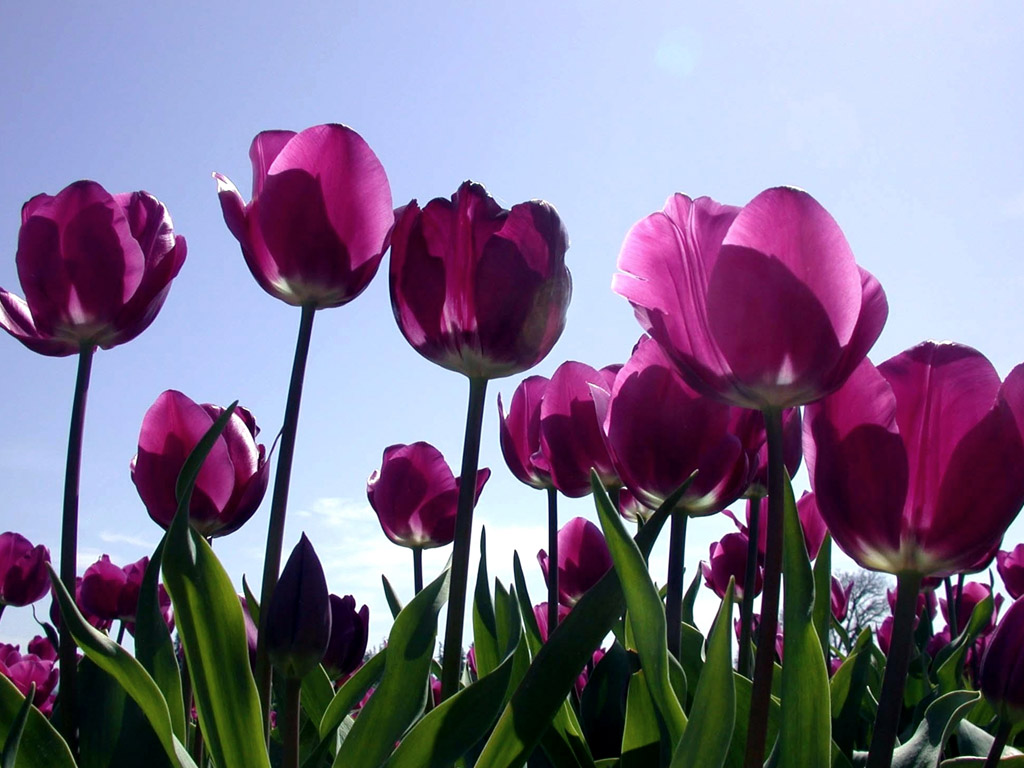
In the 20th century it was discovered that the frilly petals and dramatic flames that gave the flower its stunning look were, in fact, the symptoms of an infection by the mosaic virus. The healthy flower was supposed to be solid, smooth and monotone. The virus came to the tulip from a louse living on peaches and potatoes. Diseased varieties of tulips are no longer sold. What you find today are hybrids that look similar but are genetically stable.
There are many different types of tulips on the market from which to choose, including variegated tulips, bi-color tulips, fringed petaled tulips, lily flowered tulips, and parrot varieties, as well as the so called "peony flowered" types, which have double the usual amount of petals. "Angelique" is one such double tulip which has lovely soft pink petals.
郁金香花语:
郁金香:爱的表白、荣誉、祝福永恒
郁金香(红):爱的宣言、喜悦、热爱
郁金香(粉):美人、热爱、幸福
郁金香(黄):高贵、珍重、财富
郁金香(紫):无尽的爱、最爱
郁金香(白):纯情、纯洁
郁金香(双色):美丽的你、喜相逢
郁金香(羽毛):情意绵绵
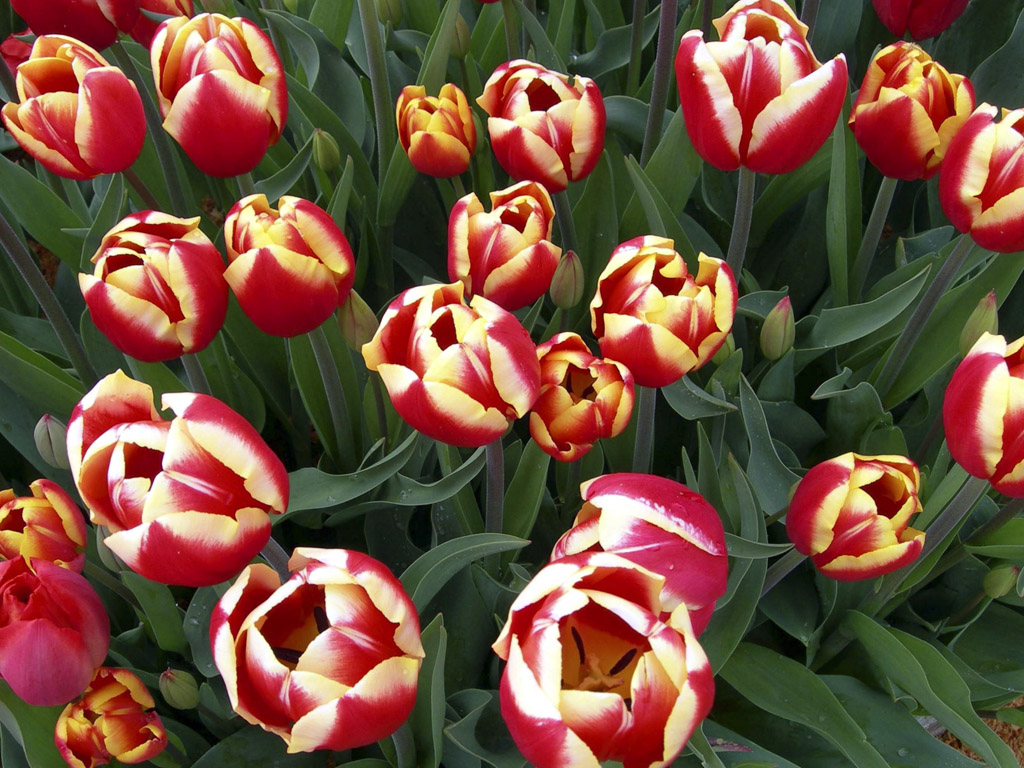
郁金香传说:
郁金香原产于土耳其和中亚细亚一带。按它的原名Tulipa,就是土耳其语“美丽的头巾”之意。早在17世纪奥斯曼帝国的御花园中,曾专门种给皇室贵族观赏。1863年被花商引进荷兰经营,他们为了推销产品特自编造了一个故事:古代有位美丽少女住在雄伟的城堡里,有三位勇士同时爱上了她,一个送她一顶皇冠;一个送把宝剑;一个送块金块。但她对谁都不予钟情,只好向花神祷告。花神深感爱情不能勉强,遂把皇冠变成鲜花,宝剑变成绿叶,金块变成球根,这样合起来便成一棵郁金香了。这故事经传开后更加深了人们对它的钟爱,不少人以拥有新奇的品种而自豪。在花市上商人乘机漫天讨价,甚至要用一头奶牛来换取一颗种头。许多荷兰人因栽种郁金香而致富。并且被公众评选为国花,至今已成为首屈一指的“郁金香大国”,畅销120多个国家,出口量占全世界总出口量的80%以上,它和风车、奶酪和木鞋成为荷兰的“四大国宝”。
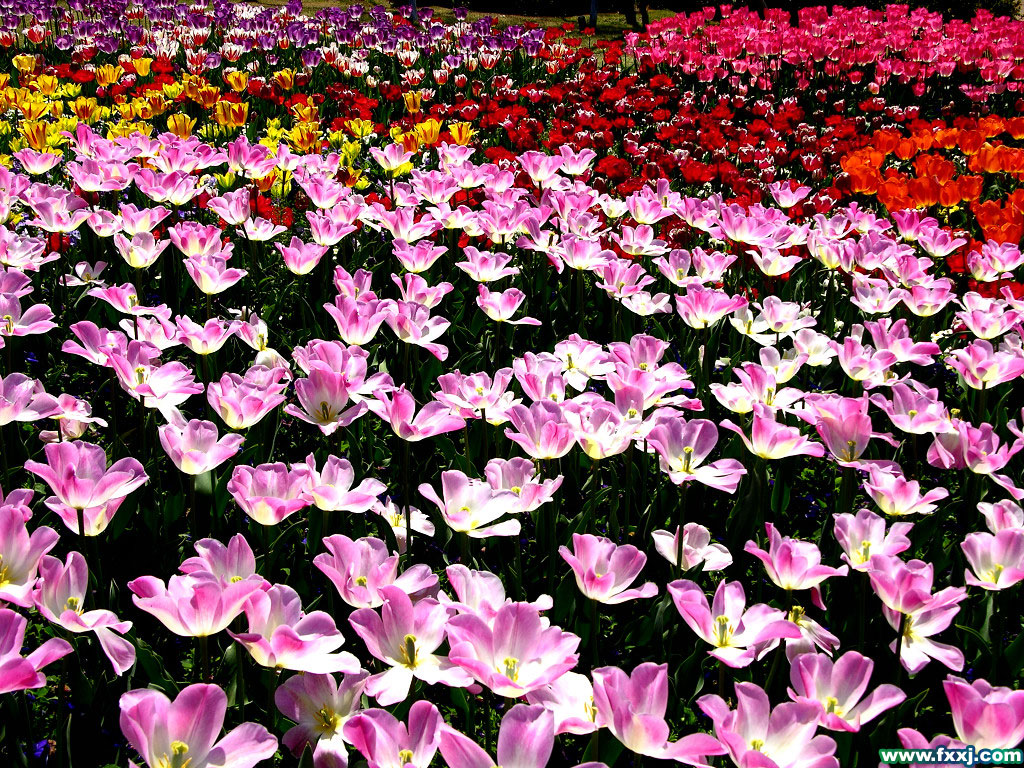
由于郁金香具有“皇帝女一不愁嫁”的潜质,许多专家都为选育新品种而废寝忘餐。据统计,全世界郁金香品种共有8100多个。其名称多得令人眼花缭乱。诸如在花瓣上洒有红点的黄花,称为“国王的血”,在花瓣上有条纹分布的红花,称为“奥林匹克火炬”,而花瓣相互抱卷的绊红色花,叫做“情人的热吻”等等。特别是昔日法国作家大仲马曾赞美过一种称为“黑寡妇”的黑郁金香“艳丽得叫人睁不开眼睛,完美得让人透不过气来”之后,黑郁金香更是声价百倍,被花迷们视为稀世奇珍。其实,这品种所开的也不过是紫得发黑而已,并非纯粹的黑色。
郁金香喜欢在冷凉的气候生长,一般适温为17~2O”C,最怕炎热和闷娟不通风的环境。在华南一带只适宜在冬季栽培。如果露地整畦种植最好种在阳光充足、土质疏松和水足肥丰的地方一,土壤的pH值(酸碱度)以6~7之间,即是不偏酸性,也不偏碱性的中性土壤为宜。如果用来盆栽,则最好选用腐叶上、细河沙、珍珠岩、蘑菇渣、干畜粪和花生麸混合而成的营养上,这样才能生长健壮,顺利开花。
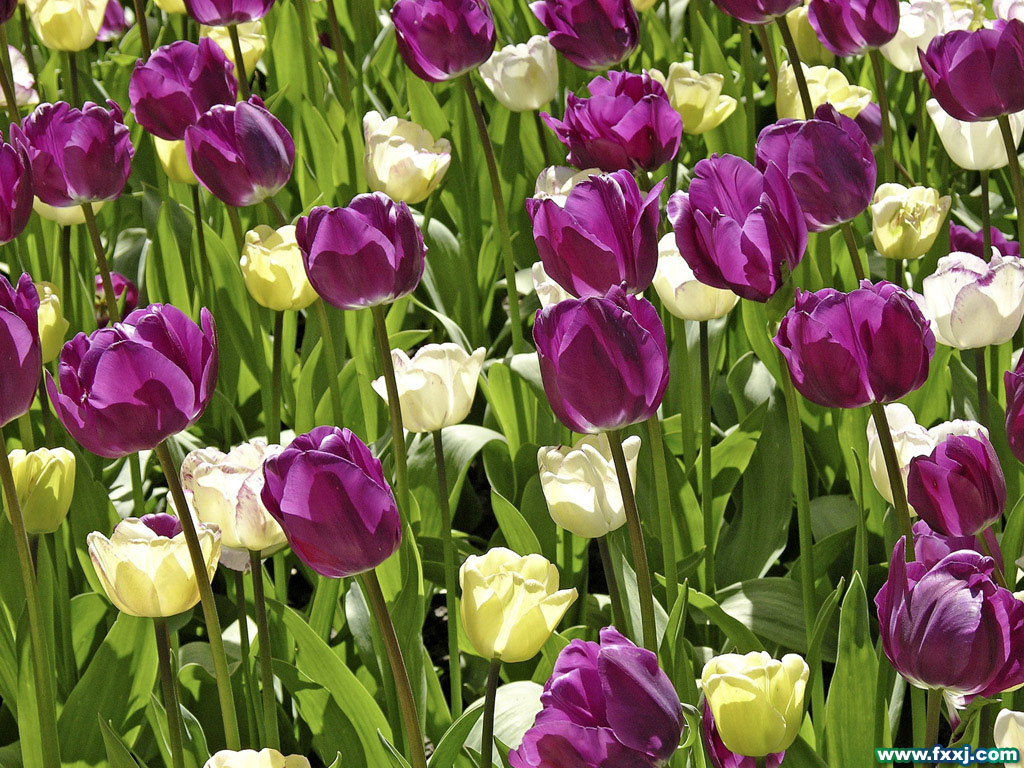
是土耳其人最先把他们著名的郁金香介绍给荷兰人,继而引发了英国和荷兰的郁金香热。16世纪从伊斯坦布尔运往维也纳的郁金香球茎极受欢迎,到了1634年,荷兰人把这称作“郁金香狂潮”。当时人们把钱投资到郁金香就好比现代人投资股票。在17世纪的土耳其,这是段充满高雅气息充满意趣的历史,被称作“郁金香时代”。

A spring trip to Amsterdam and the Netherlands is not complete without a visit to the Dutch countryside to see the tulip fields in bloom. Touring Keukenhof Gardens, the worlds' largest tulip gardens, is a wonderful shore excursion, but we were amazed at the amazing cultivated gardens throughout the country. During a trip to the Netherlands in mid-April, we saw tulip fields in Noord Holland, Zuid Holland, and Friesland. In addition, there were some beautiful tulip fields next to Keukenhof Gardens, near the large windmill.
在荷兰,郁金香是美好、庄严、华贵和成功的象征。虽说荷兰的郁金香誉满全球,其实郁金香的故土在土耳其。土耳其人更钟爱郁金香。郁金香的生物学名是Tulipa,来自土耳其语TUber1d,含义是郁金香花象包着头巾的伊斯兰教少女一样美丽。郁金香成为土耳其的国花比荷兰还早。郁金香为热爱它的人们带来了多姿多彩的幸福生活。匈牙利、伊朗、新西兰也把郁金香定为本国国花.

In the 20th century it was discovered that the frilly petals and dramatic flames that gave the flower its stunning look were, in fact, the symptoms of an infection by the mosaic virus. The healthy flower was supposed to be solid, smooth and monotone. The virus came to the tulip from a louse living on peaches and potatoes. Diseased varieties of tulips are no longer sold. What you find today are hybrids that look similar but are genetically stable.
There are many different types of tulips on the market from which to choose, including variegated tulips, bi-color tulips, fringed petaled tulips, lily flowered tulips, and parrot varieties, as well as the so called "peony flowered" types, which have double the usual amount of petals. "Angelique" is one such double tulip which has lovely soft pink petals.
郁金香花语:
郁金香:爱的表白、荣誉、祝福永恒
郁金香(红):爱的宣言、喜悦、热爱
郁金香(粉):美人、热爱、幸福
郁金香(黄):高贵、珍重、财富
郁金香(紫):无尽的爱、最爱
郁金香(白):纯情、纯洁
郁金香(双色):美丽的你、喜相逢
郁金香(羽毛):情意绵绵

郁金香传说:
郁金香原产于土耳其和中亚细亚一带。按它的原名Tulipa,就是土耳其语“美丽的头巾”之意。早在17世纪奥斯曼帝国的御花园中,曾专门种给皇室贵族观赏。1863年被花商引进荷兰经营,他们为了推销产品特自编造了一个故事:古代有位美丽少女住在雄伟的城堡里,有三位勇士同时爱上了她,一个送她一顶皇冠;一个送把宝剑;一个送块金块。但她对谁都不予钟情,只好向花神祷告。花神深感爱情不能勉强,遂把皇冠变成鲜花,宝剑变成绿叶,金块变成球根,这样合起来便成一棵郁金香了。这故事经传开后更加深了人们对它的钟爱,不少人以拥有新奇的品种而自豪。在花市上商人乘机漫天讨价,甚至要用一头奶牛来换取一颗种头。许多荷兰人因栽种郁金香而致富。并且被公众评选为国花,至今已成为首屈一指的“郁金香大国”,畅销120多个国家,出口量占全世界总出口量的80%以上,它和风车、奶酪和木鞋成为荷兰的“四大国宝”。

由于郁金香具有“皇帝女一不愁嫁”的潜质,许多专家都为选育新品种而废寝忘餐。据统计,全世界郁金香品种共有8100多个。其名称多得令人眼花缭乱。诸如在花瓣上洒有红点的黄花,称为“国王的血”,在花瓣上有条纹分布的红花,称为“奥林匹克火炬”,而花瓣相互抱卷的绊红色花,叫做“情人的热吻”等等。特别是昔日法国作家大仲马曾赞美过一种称为“黑寡妇”的黑郁金香“艳丽得叫人睁不开眼睛,完美得让人透不过气来”之后,黑郁金香更是声价百倍,被花迷们视为稀世奇珍。其实,这品种所开的也不过是紫得发黑而已,并非纯粹的黑色。
郁金香喜欢在冷凉的气候生长,一般适温为17~2O”C,最怕炎热和闷娟不通风的环境。在华南一带只适宜在冬季栽培。如果露地整畦种植最好种在阳光充足、土质疏松和水足肥丰的地方一,土壤的pH值(酸碱度)以6~7之间,即是不偏酸性,也不偏碱性的中性土壤为宜。如果用来盆栽,则最好选用腐叶上、细河沙、珍珠岩、蘑菇渣、干畜粪和花生麸混合而成的营养上,这样才能生长健壮,顺利开花。


重点单词

